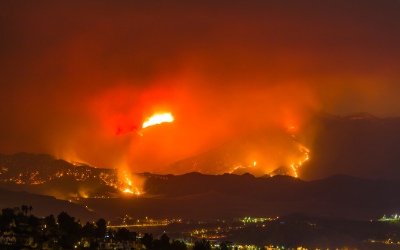
Fueled by hurricane force winds several wildfires are tearing across California. A state of emergency was declared Sunday, not only for the fires raging in Northern California, but also for a growing fire in the Los Angeles area. In order to prevent more fires from sparking from downed power lines, the state’s largest power utility shut off power in rolling blackouts over the weekend with more blackouts anticipated for this week.
As mandatory evacuation orders continue today, and continued high winds and low humidity in the forecast for tomorrow, it’s important to take heed of these warnings and evacuate immediately – taking your pets with you when you go.
Be sure to take the following with you if you can, but if fires are bearing down on your home, gather your pets and leave immediately.
- Bottled water. In many emergency situations, water becomes contaminated and tap water is not safe to drink. Additionally, with rolling power outages, water purification plants may be unable to treat and distribute water. You should have a 72-hour water supply – for both you and your pet:
- A normally active person needs about ¾ of a gallon (about 3 liters) of water (or other fluids) daily. In other words, for 72 hours, each person in your household needs about 2½ gallons (9 liters) of water. For pets, this amount varies depending on the size of the animal.
- Generally, a dog will drink between ½ and 1 ounce (15-30 mL) of water per pound of body weight per day. In other words, a 65-pound (30 kg) dog will drink between ¼-½ gallon (1-2 liters) of water daily. For 72 hours, this sized dog would need about ¾-1½ gallons (3-6 liters) of water.
- A cat’s daily water requirement is about 5-10 ounces (150 – 300 mL) of water per day. A cat would need about 15-30 ounces (450-900 mL) of water for 72 hours.
With the extreme heat, these needs will be higher.
- Be sure to have a 72-hour food supply, including food (and water) bowls and a can opener if you feed your pet canned food.
- Take all medication that you pet needs. This is extremely important if your pet’s life depends on it.
- Medical records and identification. Grab a copy of your pet’s medical records, along with your veterinarian’s contact information. Snap a photo of your pet in case you become separated during evacuation.
- Toys, blankets, towels. These familiar items will help reduce the stress your pet will undoubtedly experience if you must evacuate your home.
- Waste bags and hand wipes. Be sure to pack plenty of waste collection bags, and since water for handwashing may be limited, pack wipes and hand sanitizer for quick hand cleaning.
In the event of evacuation, pets may not be allowed inside human emergency shelters – have an alternate prearranged location to take your animals.
ALWAYS TAKE YOUR PETS WITH YOU. Never leave your pets behind thinking that you can get them later – fire conditions change and deteriorate very quickly, and you may not be able to return to your home. Do not wait until the last minute to start evacuating.
During a wildfire, local animal rescue organizations work with law enforcement and fire departments to rescue as many animals as they can. In battling a wildfire, firefighters will do what they can to rescue pets left behind, but their focus is saving human lives and structures – do not depend on them to rescue your pets.
